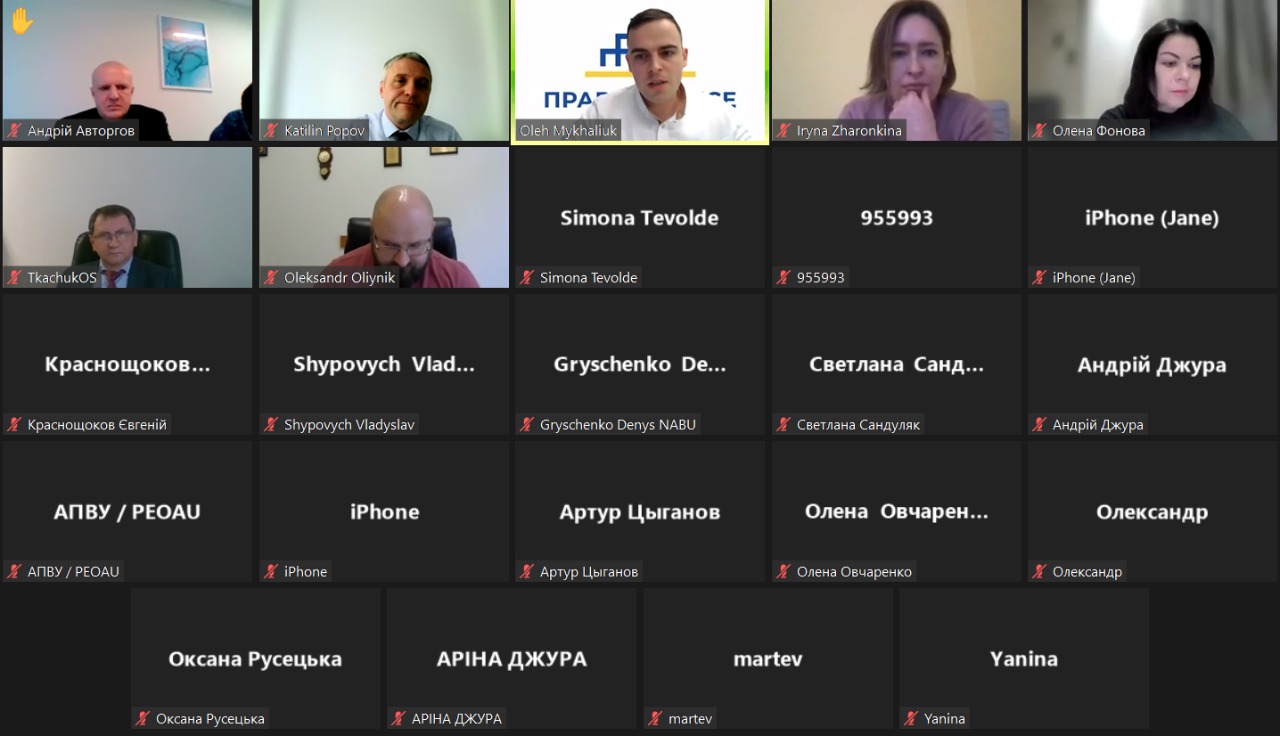EU Project Pravo-Justice Held the Online Discussion Dedicated to Challenging Actions of State and Private Enforcement Officers

On December 12, the EU Project Pravo-Justice held the online discussion “Contesting Actions of State and Private Enforcement Officers: Existing Case Law and Legislative Novelties.” The event was attended by SEOs and PEOs, representatives of the judiciary and the bank community, and lawyers.
“Procedural codes are constantly being amended, but the model of challenging actions or omissions of SEOs and PEOs remains without modernization. Despite the technical nature of this issue, it makes an important impact on our financial and economic system, systemic creditors and debtors. The analysis of the register of court decisions shows that it contains tens of thousands of cases of complaints against actions of PEOs and SEOs. This is a heavy burden on the judicial system. Therefore, it is worth discussing new approaches to contesting actions/omissions of PEOs and SEOs,” said Oleg Mykhaliuk, National Key Expert of the EU Project Pravo-Justice.
Katilin Popov, International Expert of the EU Project Pravo-Justice, shared his opinion on how the issue of challenging actions or omissions of EOs can be addressed in a better way. He came up with four conceptual proposals.
The first one is considering such complaints in specialized courts.
"A pan-European trend is specialization in the administration of justice. Speaking of Ukraine, there is no specialization in terms of judicial control over actions or omissions of EOs – complaints can be submitted to any court, that is, the court that issued the decision being executed. I believe it could be reasonable to think about making arrangements so that only certain courts have the right to deal with complaints about actions/omissions of EOs, or ensuring an even distribution of the burden among all courts,” said Katilin Popov.
The second proposal consists in the following: before filing a complaint to the court about actions/omissions of a PEO/SEO, such a complaint shall first be submitted before the EO. Such a step would create prerequisites for the cancellation of an enforcement action by the EO on the basis of the submitted complaint.
“The third proposal is to review access to cassation when filing complaints against actions or omissions of an EO, as it contradicts the mere nature of cassation review, which should apply to the norms of substantive law,” added Katilin Popov. He also proposed to enshrine in law the recovery of a court fee for filing complaints about actions or omissions of the EO.
In his speech, PEO of the city of Kyiv, Andrii Avtorgov, highlighted the fact that the objective of any judicial proceeding is to restore the violated right. However, debtors often try to challenge actions of PEOs based on formal grounds.
“In its judgments, the Supreme Court has repeatedly emphasized that the protection of the violated right is possible within the procedure of judicial control over the execution of court decisions, provided that rights, freedoms, or interests of a party to the enforcement proceedings has really been violated, and the complainant uses the judicial process exactly for such protection. When taking action before the court, a party to the enforcement proceedings shall justify, and the court, in turn, shall establish which right of the complainant as a party to the enforcement proceedings has been violated and is subject to protection within the procedure of judicial control over the execution. Initiating a case within the procedure of judicial control over the execution of a court decision for a reason other than protection of legal rights and interests shall be inadmissible,” said Andrii Avtorgov.
Oleh Tkachuk, justice of the Civil Cassation Court, informed the participants to the event with the existing judicial practice in respect of appeals against actions of SEOs and PEOs (presentation to be reviewed).
“The problems with the execution of court decisions that exist in the State indicate the need to improve judicial practice. Since the very beginning of the Supreme Court operation in 2017, our efforts have been aimed at simplifying the consideration of such complaints by applying the principle of “procedural economy”. In order to avoid massive filing of complaints in various courts – civil, economic, and administrative, the judicial practice has established that complaints about actions of EOs should be considered in administrative courts,” said Oleh Tkachuk.
In her speech, Olena Ovcharenko, Doctor of Law, Disciplinary Commissioner of PEOs in 2019-2022 stated that if in the future we have an effective model of execution, both PEOs and SEOs will faithfully comply with the law, it will result in solely judicial control over their activities; and the Supreme Court will review complaints about their actions/omissions only in exceptional cases.
Olena Fonova, judge of the Economic Court of Luhansk region, Coordinator of the Donbas Regional Justice Reform Council, underlined, in particular, the expediency of increasing the terms of judicial consideration of complaints against actions of EOs.
Based on the outputs of the online discussion, the experts of the EU Project Pravo-Justice will summarize all the proposals voiced by the participants to the event and address them to the Verkhovna Rada Committee on Legal Policy and the Ministry of Justice of Ukraine for consideration in further legislative efforts.